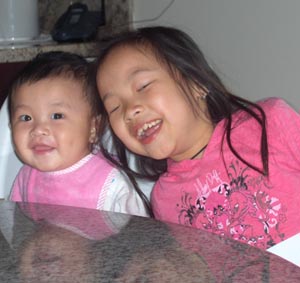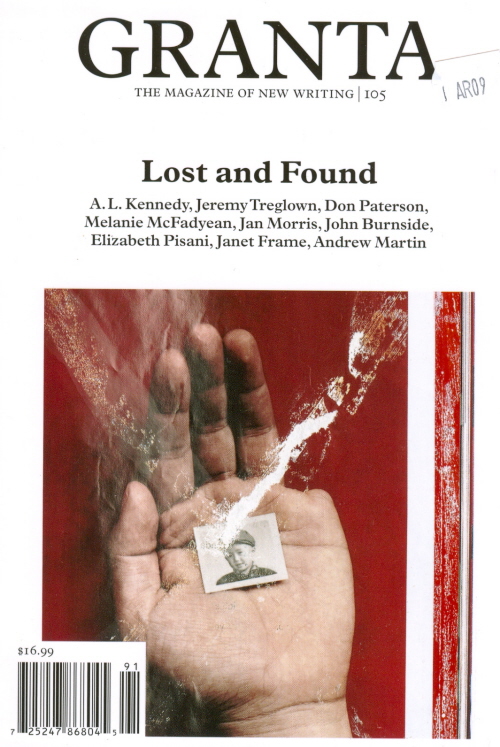|
Lưới
khuya,
hồn ốc lạc thiên đường

Happy Birthday to you, Mom.
13.4. 2009
Richie & Jennifer Tran

Un renouvellement de la
culture de masse
Wikipédia
ou la fin de
l’expertise ?
Le printemps de Milan Kundera
par Guy Scarpetta
Mùa Xuân của Kundera
là một bài điểm cuốn mới ra lò của Kundera, Một
cuộc gặp gỡ, trên tờ Thế giới ngoại
giao, số Tháng Tư, 2009. Tin Văn sẽ
có bài tóm tắt.
Thằng
Khờ được việc
Người và Việc:
Trần Phong Giao, người gác
cổng văn học, tạp chí Văn
Sunday, April 05, 2009
Du Tử Lê
Cái tít này, “người gác cổng”, theo Gấu, mô phỏng của một tay ở trong
nước. (1)
Văn học nào mà cần người gác
cổng?
Người và Việc?
Chẳng lẽ một bài tưởng niệm, bạn bè của nhà thơ, và nhân đó, cả một nền
văn học, mà nhét vô mục Chó Cán Xe như
thế này?
(1) Hoàng Hưng, Thơ
Việt Nam
đang chờ phiên đổi gác.
Note: V/v ẩn dụ 'ngưòi gác' này, Gấu nghi, mấy anh
thi sĩ
VC thuổng của ngoại quốc, nhưng họ dùng theo cái nghĩa, người gác đền
thiêng, viện chư thần, đỉnh thi sơn...
Đền thiêng thì cần có người gác, còn kiêm việc ông từ, ngày ngày lo
việc cúng bái, cầu nguyện...
Bài viết của bạn ta có vài sai sót. Phạm Thị Hoài viết thành Nguyễn Thị
Hoài. Nguyên Ngọc không phải là người khám phá ra bà này, cũng không
phải là tác giả cụm từ 'văn chương minh họa' [của Nguyễn Minh Châu].
Trịnh Công
Sơn vs Lịch Sử
TCS:
Kẻ Sĩ?
30.4.2009
Under Construction!
NMG vs Lưu
Vong
Quand
Robert parle de
Jonathan
Littell,
père et fils
Cha
& Con Littell.
Ông bố
thì bị ám ảnh bởi chủ
nghĩa toàn trị Stalin, ông con, Nazi.
Tên ông
con, Jonathan October
Littell., là để đời đời ghi nhớ Cách
Mạng Tháng 10!
Tác
phẩm mới nhất của ông bố:
Chim Báo Bão, kể cuộc đụng độ giữa nhà thơ Mandelstam và đao phủ Stalin.
Life vs
Death

Cutting
Off Dissent:
Cắt ngón
tay li khai: Để phản đối biến cố Thiên An
Môn, 1989, nghệ sĩ Sheng Qi cắt ngón tay, tạo ra một số hình ảnh bàn
tay cụt ngón
tay của mình, trong có tấm hình ở nơi lòng bàn tay, là tấm hình một đứa
bé
trai.
Mất đi
và Kiếm lại được
*
EDITOR'S LETTER
ALEX CLARK
The vanishing point:
Điểm biến
When something is
lost, our
first instinct is often towards preservation: either of the thing
itself, its
memory and its traces in the world, or of the part of us that is
affected by
what is now missing. The pieces in this issue of Granta reflect on the
complex
business of salvage and try to bring into the light what we discover
when we
come face to face with loss.
It is rarely a
straightforward process.
JeremyTreglown's
thought provoking exploration of the gathering movement to exhume the
victims
of the Spanish Civil War amply demonstrates the tensions created when a
desire
to commemorate clashes with a desire to move forward, and when both
entirely
natural impulses are claimed by other agendas. Although his
investigation
illuminates the continuing aftermath of a particularly dark and
disastrous
episode in Spanish history, it has clear parallels with other
countries'
attempts to recover from traumatic events and forces us to question
whether an
apparently simple urge to remember and to pay tribute can remain
uninflected by
other equally complex concerns.
A similar ambiguity
informs
Maurice Walsh's dispatch from Ireland,
where he travelled to spend time with the Catholic priests whose
numbers have
been diminishing over the past few decades. He reports of a decline in
vocations that coincided with a widespread rise in secularism and an
attitude
towards the Church that hardened - perhaps irreversibly - after the
wave of
child-abuse scandals in the 1990s, which were seen not merely as
instances of
individual wrongdoing but as evidence of a collusion between a powerful
hierarchy and those whom it had sent into the community as trusted
individuals.
This shift in perspective has been well documented and, when the writer
and I
spoke about the piece in its earliest stages, we agreed that a fruitful
focus
would be what the priests themselves felt about this process of
marginalization.
Elsewhere, we feature some
extremely personal stories, perhaps none more so than Melanie
McFadyean's
'Missing', which relates the experiences, over nearly two decades, of
the Needham
family. Ben
Needham, a child of twenty-one months, disappeared on the Greek island of Kos in 1991; he has never been
found.
The moment of his disappearance - the moment when he was last seen by
members
of his family - resonates through her account with its utter
simplicity; a
child, playing in the sun, running in and out of doors, being
completely
childlike and completely unselfconscious. Then silence, and absence;
and then
the continuing lives of Ben's mother, Kerry, his grandparents, his
uncles and
the sister born after he disappeared. It is a familiar fictional
device, and
often characteristic of the stories we tell ourselves about defining
periods in
our lives, to suggest that everything can change in an instant. Much of
the
time, that is not really true, and rather more likely that a crisply
delineated
sequence of events allows us to cope with chaos and confusion. In the
case of
the Needhams, though, even that world-altering single moment, viewed
through
the prism of different people and the passage of time, can remain
painfully
resistant to closure.
There is a different kind of
examination of the past going on in Elizabeth Pisani's 'Chinese
Whispers', in
which the author recalls the night that she spent in Tiananmen Square
twenty
years ago, frantically attempting to phone in reports to her news
agency as
tanks (not to be confused with armored personnel carriers, as her
bosses on the
other end of the line curtly impressed on her) rolled in to crush the
ranks of
pro-democracy protestors filling the Square.
But Pisani's resurrection of
a night that, to her, an inexperienced reporter of twenty-four, was the
most
momentous she had ever lived through, proves rather harder to pin down
in the
retelling. Is her version of events correct to the last detail? Or has
she
embroidered and finessed her memories in the intervening years?
Sometimes, of course,
the
changing of the guard makes room for us to cast a lighter eye over
events, as
in Don Paterson's piece of memoir, which tells of his youthful passion
- and
passion is the right word - for evangelical Christianity, an effort to
exoticize his everyday life that led to fervent prayer sessions
enlivened by
the odd bout of angeloglossia. It seems that what he discovered as his
faith
faded was an unshakeable enthusiasm for rational thought. But he also
conjures,
as the best memoirs do, a portrait of another time - in this case, a
world of
weak tea, Jammie Dodgers and fearsome bullies. Equally evocative are
the pipe
smokers, captured in Andrew Martin's ode to a pleasure in peril, who
have found
themselves defending their commitment to a slower, temptingly detached
way of
life - their special brand of 'hypnotic latency', as Martin puts it.
In among these surveys of
vanishing worlds come three pieces of fiction: an artfully poignant
story by
Janet Frame, a wry tale of dentistry and disarray by A. L. Kennedy and
two
pieces of work by Altan Walker. Of Earthly Love, Walker's debut novel,
was
several years in the writing, rewriting and recasting and had yet to be
finished when the writer died in 2007. As I began to read the
manuscript,
knowing that it would never now be completed, I felt immediately that
if it
were to remain unseen readers would be deprived of a true delight; one
that
would introduce them to a wild, shifting, ungovernable voice, capable
of great
acts of ventriloquism and imagination. It is a real pleasure to be able
to
publish part of Walker's
manuscript here and to know that, in among the varieties of loss that
we are
often subject to, there remain treasures to find. _
NTS by NQL
Có lẽ
lần đầu tiên nó biết
thế nào là hạnh phúc.
NQL
Câu này, ‘độc’ hơn thịt vịt!
Chỉ những ai biết về NTS,
‘người đi qua đời tôi’, của biết bao nhiêu là em, thì mới thú câu này!
Tuyệt!
Cả băng này, Gấu đều quen, trừ
NQL, nhưng cái tay bảnh nhất, không phải là mấy tay hay được nhắc đến
như PXN,
NTS…
NQT
BVVC
The destruction of someone's
native land is as one with that person's destruction. Séparation
becomes
déchirure [a rendingl, and there can be no new homeland. "Home is the
land
of one's childhood and youth. Whoever has lost it remains lost himself,
even if
he has learned not to stumble about in the foreign country as if he
were
drunk." The ‘mal du pays’ to which Améry confesses, although he wants
no
more to do with that particular pays—in this connection he quotes a
dialect
maxim, "In a Wirthaus, aus dem ma aussigschmissn worn is, geht ma
nimmer
eini" ("When you've been thrown out of an inn you never go
back")—is, as Cioran commented, one of the most persistent symptoms of
our
yearning for security. "Toute nostalgie," he writes, "est un
dépassement du présent. Même sous la forme du regret, elle prend un
caractère
dynamique: on veut forcer le passé, agir rétroactivement, protester
contre
l'irréversible." To that extent, Améry's homesickness was of course in
line with a wish to revise history.
Sebald viết về Jean Améry:
Chống Bất Phản Hồi: Against The Irreversible.
[Sự huỷ
diệt quê nhà của ai
đó thì là một với sự huỷ diệt chính ai đó. Chia lìa là tan hoang, là
rách nát,
và chẳng thể nào có quê mới, nhà mới. 'Nhà là mảnh đất thời thơ ấu và
trai trẻ
của một con người. Bất cứ ai mất nó, là tiêu táng thòng, là ô hô ai
tai, chính
bất cứ ai đó.... ' Cái gọi là 'sầu nhớ xứ', Améry thú nhận, ông chẳng
muốn sầu
với cái xứ sở đặc biệt này - ông dùng một phương ngữ nói giùm: 'Khi bạn
bị
người ta đá đít ra khỏi quán, thì đừng có bao giờ vác cái mặt mo trở
lại' -
thì, như Cioran phán, là một trong những triệu chứng dai dẳng nhất của
chúng
ta, chỉ để mong có được sự yên tâm, không còn sợ nửa đêm có thằng cha
công an
gõ cửa lôi đi biệt tích. 'Tất cả mọi hoài nhớ', ông viết, 'là một sự
vượt thoát
cái hiện tại. Ngay cả dưới hình dạng của sự luyến tiếc, nó vẫn có cái
gì hung
hăng ở trong đó: người ta muốn thọi thật mạnh quá khứ, muốn hành động
theo kiểu
phản hồi, muốn chống cự lại sự bất phản hồi'. Tới mức độ đó, tâm trạng
nhớ nhà
của Améry, hiển nhiên, cùng một dòng với ước muốn xem xét lại lịch sử].
*
Nhà văn là một thứ phong vũ
biểu. Thứ dữ dằn, một loài chim báo bão.
"Gấu nhà văn", về nhà hai lần,
nhưng lần thứ ba, tính về, ngửi thấy có gì bất an, hay là do quá rét,
bèn đi một
cái mail, hỏi thăm thời tiết nơi quê nhà, và được trả lời, không được
đẹp, thế
là bèn đếch có dám mò về!
*
Khi thằng cu Gấu lên tầu há mồm
vô Nam, bỏ chạy quê hương Bắc Kít của nó, ngoài hai cái rương [cái hòm]
bằng gỗ
nhỏ, có thể để mỗi cái lên một bên vai, trong đựng mấy cuốn sách, thằng
bé còn thủ theo, toàn là
những
kỷ niệm về cái đói.
Và nửa thế kỷ sau trở về, cũng mang về đầy đủ những
kỷ niệm
đó, và trên đường về, tự hỏi, không hiểu bà chị mình có còn giữ được
chúng…
Bà giữ
đủ cả, chẳng thiếu một, nhưng, chị giữ một kiểu, em giữ một kiểu.
Nói rõ
hơn, cũng những kỷ niệm
về cái đói đó, ở nơi Gấu, được thời tiết Miền Nam làm cho dịu hết cả
đi, và đều
như những vết sẹo thân thương của một miền đất ở nơi Gấu.
Y như kỷ niệm sau đây,
lần đầu làm quen thành phố Sài Gòn.
*
1965. Những ngày cuộc chiến
tuy chưa dữ dội nhưng đã hứa hẹn những điều khủng khiếp. Người Mỹ đổ
quân xuống
bãi biển Đà Nẵng, liền sau đó là lần chết hụt của tôi tại nhà hàng Mỹ
Cảnh. Tất
cả những sự kiện đó, mỉa mai thay, chỉ làm cho bóng ma chiến tranh thêm
độc,
đẹp, thêm quyến rũ và trở thành những nét duyên dáng không thể thiếu
của cô bé.
Của Sài-gòn.
Chỉ có
những người vội vã rời
bỏ Sài-gòn ngay những ngày đầu, họ đã không kịp sửa soạn cho mình một
nỗi nhớ
Sài-gòn. Còn những ai ở trong tâm trạng sắp sửa ra đi, đều tập cho quen
dần với
cơn đau sẽ kéo dài. Đều lựa cho mình một góc đường, một gốc cây, một
mái nhà...
để cười hay để khóc một mình. Một mẩu đời, một đoạn nhạc, một bóng
chiều, một
giọt mưa, một sợi nắng... để gọi thầm trong những lúc quá cô đơn. Để
mai kia
mốt nọ, trên đường tha phương cầu thực, nơi đất khách quê người, những
khi ngọn
gió heo may bắt đầu thổi, những khi ngồi bó gối bên trời, nhìn lá vàng
rơi đầy,
lấy tay che thời gian không nổi, hay những đêm tàn nghe bếp lửa réo
gọi... sẽ
nhâm nhi những cọng cỏ tưởng tượng của quê hương. Ôi,"Ôm em trong tay
mà
đã nhớ em ngày sắp tới" (1). Hãy cho tôi thăm lại con phố Bonard, nơi
có
bót Hàng Ken (2), chú bé di cư ngày nào ngơ ngác, rụt rè làm quen, tự
mình khám
phá Sài-gòn. Gần gốc cây chỉ còn trong cậu bé ngày xưa, một người đàn
ông đánh
đập dã man một người đàn bà. Không quên bài học Công Dân, chú bé chạy
vào trong
bót. Chú bị ăn bạt tai, cùng những lời sỉ vả, người ta đánh vợ, mắc mớ
chi tới
mày. Đồ con nít Bắc kỳ di cư, vô đây làm tàng. Ôi bài học đầu tiên khi
tìm cách
làm quen thành phố, được thời gian gọt giũa trở thành một nốt ruồi son
đáng yêu
biết là chừng nào trên khuôn mặt cô bé. Trên khuôn mặt Sài-gòn.
Một thành phố mà tôi đã chết
ở trong,
nay sống lại,
chỉ để kể về nó.
Lần Cuối Sài Gòn
Kỷ
niệm, kỷ niệm
Simenon
trả lời tờ The Paris Review
|
|



